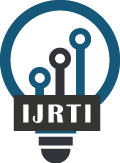|
International Journal for Research Trends and Innovation
International Peer Reviewed & Refereed Journals, Open Access Journal
ISSN Approved Journal No: 2456-3315 | Impact factor: 8.14 | ESTD Year: 2016
Scholarly open access journals, Peer-reviewed, and Refereed Journals, Impact factor 8.14 (Calculate by google scholar and Semantic Scholar | AI-Powered Research Tool) , Multidisciplinary, Monthly, Indexing in all major database & Metadata, Citation Generator, Digital Object Identifier(DOI)
|
Issue: February 2026
Volume 11 | Issue 2
Review Result and Publication of Paper within : 2-3 days
Click Here For more DetailsFor Authors
Forms / Download
Published Issue Details
Editorial Board
Other IMP Links
Facts & Figure
Impact Factor : 8.14
Issue per Year : 12
Volume Published : 11
Issue Published : 117
Article Submitted : 21156
Article Published : 8433
Total Authors : 22205
Total Reviewer : 799
Total Countries : 156
Indexing Partner
Licence
This work is licensed under a Creative Commons Attribution-NonCommercial 4.0 International License







|
Published Paper Details
|
|
| Paper Title: | Impact of Self-instructional module on using spoon and Paladai feeding among mothers of premature babies |
| Authors Name: | Mrs. Priyanka.J |
| Download E-Certificate: | Download |
| Author Reg. ID: |
IJRTI_189980
|
| Published Paper Id: | IJRTI2406031 |
| Published In: | Volume 9 Issue 6, June-2024 |
| DOI: | |
| Abstract: | Premature newborns may not be able to handle milk feedings immediately away since they are small at birth. While intravenous (IV) feedings offer vital nutrients to support your baby's growth, breast milk feedings promote healthier growth in infants. As a result, a large number of preemies grow poorly in the NICU and are underweight for their age when they are released from the hospital. More benefits of good feeding than merely longer and heavier preemies are seen. Breastfeeding promotes brain development in preemies. Better nutrition from birth helps premature babies grow larger brains and experience fewer developmental difficulties as they age. Preemies need to have strong catch-up growth during the first few months of life in order to support the development of their brains. Ideally, a baby should reach normal development by the time their corrected age is three months. This implies that a preemie should fall into the typical range for height, weight, and head circumference measures three months beyond the original due date. Objectives: 1) To evaluate the effectiveness of SIM on knowledge using spoon and paladai feeding among mothers of premature babies Approach: Evaluative approach was selected for the study. Design: Quasi-experimental (one group pretest and posttest) was selected for the study. Subjects: 60 mothers of premature babies. Sampling Technique: A purposive sampling technique was used to select the sample for study. Data Collection Tool: A structured questionnaire was used to collect data from the subjects. Data Analysis: The obtained data was analyzed using descriptive and inferential statistics and interpreted in terms of objectives and hypothesis of the study. The level of significance was set at 0.05 levels. Results: 61.6% of the subjects showed adequate knowledge after treatment. No subjects were there with adequate knowledge during pre-test. Likewise, no subjects found with inadequate knowledge during post-test. In addition, percentage of people with moderate knowledge also increased from 36.6% to 38.3%. |
| Keywords: | Impact, Self-instructional module, spoon and Paladai feeding, mothers of premature babies |
| Cite Article: | "Impact of Self-instructional module on using spoon and Paladai feeding among mothers of premature babies", International Journal for Research Trends and Innovation (www.ijrti.org), ISSN:2455-2631, Vol.9, Issue 6, page no.225 - 232, June-2024, Available :http://www.ijrti.org/papers/IJRTI2406031.pdf |
| Downloads: | 000205282 |
| ISSN: |
2456-3315 | IMPACT FACTOR: 8.14 Calculated By Google Scholar| ESTD YEAR: 2016 An International Scholarly Open Access Journal, Peer-Reviewed, Refereed Journal Impact Factor 8.14 Calculate by Google Scholar and Semantic Scholar | AI-Powered Research Tool, Multidisciplinary, Monthly, Multilanguage Journal Indexing in All Major Database & Metadata, Citation Generator |
| Publication Details: |
Published Paper ID: IJRTI2406031
Registration ID:189980
Published In: Volume 9 Issue 6, June-2024
DOI (Digital Object Identifier):
Page No: 225 - 232 Country: thiruvananthapuram, Kerala, India Research Area: Medical Science Publisher : IJ Publication Published Paper URL : https://www.ijrti.org/viewpaperforall?paper=IJRTI2406031 Published Paper PDF: https://www.ijrti.org/papers/IJRTI2406031 |
| Share Article: | |
|
Click Here to Download This Article |
|
| Article Preview | |
|
|
|
Major Indexing from www.ijrti.org
| Google Scholar | ResearcherID Thomson Reuters | Mendeley : reference manager | Academia.edu |
| arXiv.org : cornell university library | Research Gate | CiteSeerX | DOAJ : Directory of Open Access Journals |
| DRJI | Index Copernicus International | Scribd | DocStoc |
ISSN Details
 |
 |
ISSN: 2456-3315
Impact Factor: 8.14 and ISSN APPROVED,
Journal Starting Year (ESTD) : 2016
DOI (A digital object identifier)
 Providing A digital object identifier by DOI.ONE How to Get DOI? |
Conference
Open Access License Policy
Important Details
Join RMS/Earn 300
WhatsApp
Click Here
Click Here
Indexing Partner |
|||
| Copyright © 2026 - All Rights Reserved - IJRTI | |||






